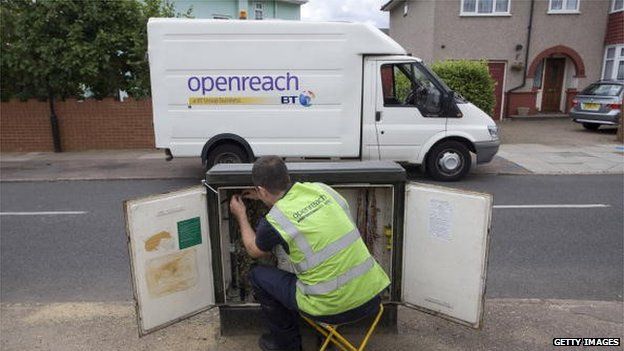

-
16 July 2015
- From the section Business
- comments

At first reading, the notion that the communications regulator Ofcom could set about BT with an axe would be assumed to be generally bad news for Britain’s formerly state-run telecommunications business.
But this morning, BT’s share price has hardly wavered despite Ofcom suggesting that its highly lucrative Openreach division could be sold off.
Openreach is the “utility” bit of BT, the delivery mechanism for broadband to millions of customers.
Think Network Rail owning the railways bit of the train network, or National Grid owning the electricity grid which delivers power to our home.
Openreach is virtually a monopoly service, with Sky, TalkTalk, Virgin and others obliged to pay BT for access to the broadband “pipes”.
And as such it is heavily regulated already.
The reason the share price has not moved much this morning is two-fold.
First, because any possible enforced sale is still a long way off.
And second, because if there is a sale, many investors believe it would crystallise a huge amount of value for BT and, therefore, for them. Openreach would be a business large enough to sit comfortably in the FTSE 100.
This morning I spoke to John Fingleton, the former head of the Office of Fair Trading.
He is clear. The “enormously profitable” Openreach would be likely to perform better as a standalone company.
Mr Fingleton argues that a separate Openreach would be likely to invest more in improving broadband connections.
As an example he cites Worldpay, a former division of the Royal Bank of Scotland.
Worldpay operates a “plumbing business” for banks – providing payment services for card transactions and mobile phones.
Since RBS sold it, as a condition of the bank’s taxpayer bailout in 2008, its new private equity owners, Bain and Advent, have significantly increased investment.
Many believe that Openreach would travel the same route, and the amount invested in it as a standalone business would be more than the present £1bn BT provides each year.
It could also mean accelerated investment in changing the network from the older copper network to “super-fast” fibre.
To enforce a sale, BT’s ownership of Openreach would probably need to be referred to the Competition and Markets Authority which has more muscle in this area than Ofcom.
Mr Fingleton agrees this is the best route to decide whether Openreach would be better out of BT’s hands.
Sky – of course a major competitor to BT – concurs, calling this morning for a referral to the CMA.
It says that BT’s performance on broadband delivery leaves a lot to be desired, and that under-investment means that appointments to connect its customers to broadband are often missed and that faults regularly remain unfixed.
Sky and BT don’t like each other very much, particularly since the latter took a healthy portion of Sky’s lunch by piling into sports television and winning the rights to broadcast Premier League matches.
There are dark mutterings that BT uses the vast profits from Openreach to fund its incursion into television, a claim the company hotly denies.
BT insists that Openreach’s service has improved, with 2,500 engineers added in the last year and 700 more coming this year. It says it reaches or exceeds all of the 60 service targets set it by Ofcom.
And that it is only because of BT’s large and healthy balance sheet that so much investment has been made in upgrading the network to super-fast broadband.
What won’t be superfast is the Ofcom process. This is the latest stage in a far wider review of the UK’s digital market which will take months to conclude and years to implement.
Any investors licking their lips at the prospect of a lucrative sale of Openreach will be waiting a good while yet.


